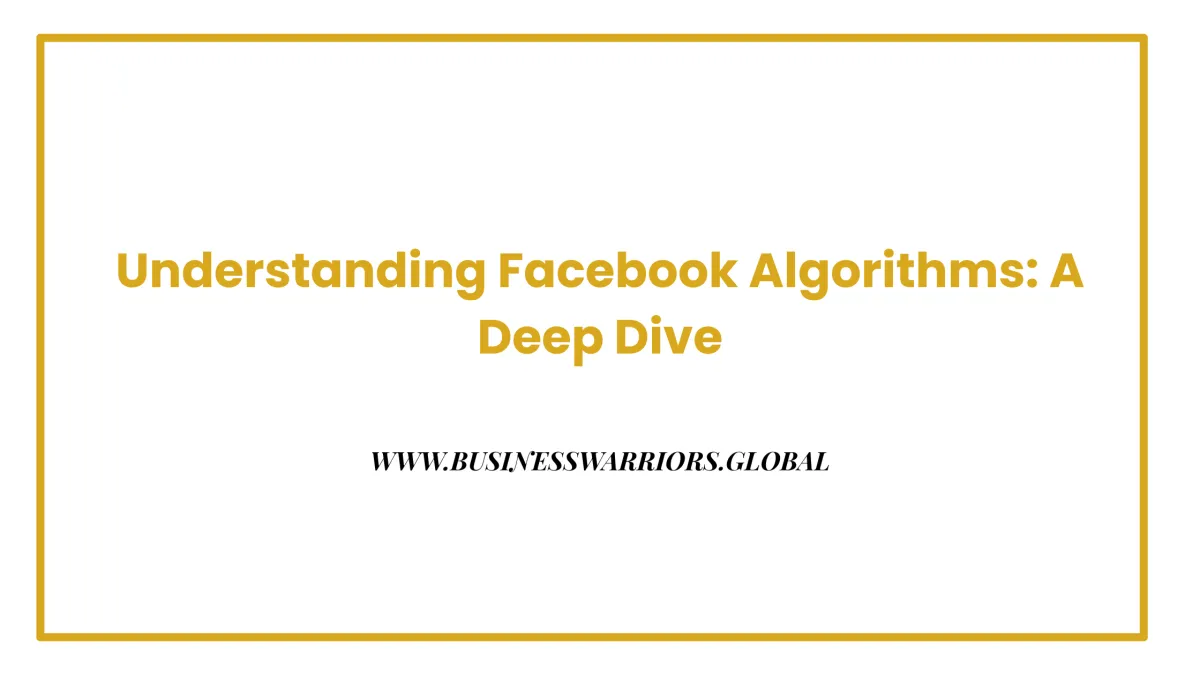
Understanding Facebook Algorithms: A Deep Dive
Facebook’s feed is no accident. Every post, photo, and ad that pops up is there because of algorithms deciding what every user might want to see. Most people are stunned to learn these systems curate the experience for over 3 billion users worldwide. But fewer realise the real power lies in how these algorithms constantly learn and adapt, shaping what grabs your attention and even what you might buy next.

Table of Contents
Quick Summary
Understanding algorithms is essential for businesses
Comprehending Facebook algorithms helps businesses strategize their content for better visibility and engagement.
Engagement quality is prioritized over quantity
The algorithms value meaningful interactions, making it crucial for businesses to focus on creating engaging content.
Content relevance drives user engagement
Algorithms assess user preferences and historical interactions to display relevant content, impacting user engagement levels.
Adapt content strategies to algorithmic preferences
Businesses should align their content strategies with algorithmic guidelines to improve visibility and reach among targeted audiences.
Continuous monitoring is key to success
Regularly assessing and adjusting content performance helps businesses stay competitive and engage effectively with their audience.
What are Facebook Algorithms and Their Purpose?
Facebook algorithms represent complex computational systems designed to curate personalised digital experiences for billions of users worldwide. These intricate mathematical frameworks determine what content appears in users' feeds, who sees specific posts, and how information gets prioritised and distributed across the platform.
Understanding Core Algorithm Mechanics
At their fundamental level, Facebook algorithms operate through sophisticated machine learning processes that analyse massive datasets of user interactions. Learn more about our Facebook Ads expertise to understand how these algorithmic systems impact digital marketing strategies.
The primary objectives of Facebook algorithms include:
Maximising user engagement by presenting most relevant content
Predicting user preferences based on historical interaction patterns
Filtering potentially inappropriate or low-quality content
Balancing content from personal connections with sponsored materials

The Purpose Behind Algorithmic Filtering
According to research from the eSafety Commissioner, algorithms help computers solve complex decision making problems by sorting through enormous amounts of content. For Facebook, this means creating a personalised feed that keeps users scrolling, clicking, and interacting.
These algorithmic systems continuously learn and adapt, analyzing signals like:
User engagement rates with specific content types
Time spent viewing particular posts
Interaction frequency with specific friends or pages
Individual content preferences and historical browsing behaviour
By processing these intricate datasets, Facebook's algorithms aim to create a uniquely tailored experience that feels simultaneously personal and compelling for each individual user.
The Importance of Understanding Facebook Algorithms for Businesses
For businesses operating in the digital landscape, comprehending Facebook algorithms is no longer optional but a critical strategic imperative. These complex computational systems fundamentally shape how potential customers discover, interact with, and engage with business content across the platform.
Strategic Visibility and Reach
Facebook algorithms determine the visibility of business content, directly impacting marketing efforts and potential customer acquisition. Explore our social media advertising strategies to understand how algorithmic insights can transform digital marketing approaches.
Key implications for businesses include:
Controlling content distribution and audience reach
Understanding precise mechanisms of content prioritisation
Developing targeted marketing strategies aligned with algorithmic preferences
Maximising organic and paid content performance
Competitive Digital Marketing Intelligence
According to research from the University of Sydney, different content communication strategies significantly influence user engagement, making algorithmic understanding crucial for competitive positioning.
Businesses must recognize that Facebook algorithms evaluate content through multiple sophisticated metrics:
Engagement quality and interaction rates
Content relevance and timeliness
User behaviour and historical interaction patterns
Authenticity and perceived value of shared information
By decoding these algorithmic nuances, businesses can craft more intelligent, targeted content strategies that enhance visibility, drive engagement, and ultimately convert potential customers more effectively.
How Facebook Algorithms Sort and Prioritise Content
Facebook's content sorting mechanism represents a sophisticated digital ecosystem where machine learning and user interaction data converge to create personalised digital experiences. These algorithms continuously analyse and rank content to ensure users receive the most engaging and relevant information possible.
Ranking Signals and Content Evaluation
The algorithmic sorting process relies on multiple complex ranking signals that assess content quality, relevance, and potential user engagement.
Explore our insights on social media content strategies to understand how digital platforms evaluate content effectiveness.
Key ranking signals include:
User's previous interactions with similar content
Post engagement rates (likes, comments, shares)
Relationship strength between content creator and viewer
Timeliness and recency of the post
Content type and predicted user interest
Predictive Content Distribution Mechanics
According to computational research from Queensland University of Technology, algorithms create intricate networks of content sharing by identifying high-profile vectors of information distribution. These systems continuously learn and adapt, predicting which content will most likely capture user attention.
The algorithmic evaluation process considers multiple sophisticated parameters:
Depth of user engagement with specific content types
Network connectivity and information propagation patterns
Individual user's historical interaction preferences
Content authenticity and perceived value
By processing these complex datasets, Facebook's algorithms create a dynamic content ecosystem that feels personalised, responsive, and uniquely tailored to each individual user's digital experience.
Key Factors Influencing Facebook Algorithm Decisions
Facebook's algorithmic decision making represents a complex interplay of technological sophistication and user behavioural analysis. The platform continuously evaluates multiple intricate factors to determine content visibility, engagement potential, and user experience relevance.
User Interaction Dynamics
User interactions form the foundational cornerstone of algorithmic decision making. Explore how content assessment drives digital marketing strategies to understand the nuanced mechanics of digital platform evaluation.
Critical interaction signals include:
Speed and frequency of post engagement
Quality of interactions (comments versus passive likes)
Relationship proximity between content creator and viewer
Historical interaction patterns with similar content types
Emotional resonance of user responses
Sophisticated Content Evaluation Mechanisms
According to research from the University of Melbourne, social media algorithms optimise for user engagement by analysing intricate interaction metrics that go beyond surface level interactions.
The comprehensive evaluation process considers:
Content format diversity and user preferences
Information authenticity and credibility signals
Temporal relevance and timeliness of posts
Network connectivity and information propagation potential
Individual user's predicted content consumption patterns
By synthesizing these multifaceted data points, Facebook's algorithms construct a dynamic, personalised content ecosystem that adapts in real time to shifting user preferences and interaction landscapes.
Below is an overview of the main factors considered by Facebook algorithms when making content ranking decisions, summarising key evaluation points discussed in this section.
Key FactorDescription
User Engagement RatesMeasures likes, comments, shares, and the quality of each interactionRelationship StrengthPrioritises posts from users or pages you interact with frequentlyRecency and TimelinessFavouring newer or more recently interacted-with contentContent Type and RelevanceAnalyses if the format and subject match the user’s interestsHistorical Interaction PatternsConsiders user’s past behaviour and interaction patternsInformation Authenticity and ValueConsiders credibility signals and the perceived quality of the shared content
Real-World Impact of Facebook Algorithms on Your Business
Facebook algorithms have transformed digital marketing from a simple broadcasting platform to a sophisticated, data-driven ecosystem where strategic content placement determines business visibility and customer engagement. Understanding these algorithmic nuances becomes crucial for businesses seeking meaningful digital presence and customer connection.
Content Visibility and Business Reach
The algorithmic landscape directly influences how potential customers discover and interact with business content. Learn about selecting the right social media marketing approach to navigate these complex digital environments effectively.
Significant business implications include:
Reduced organic reach without strategic content planning
Increased competition for user attention
Higher importance of engagement quality over quantity
Necessity for authentic, value-driven content creation
Critical need for understanding audience interaction patterns
Economic and Marketing Transformation
According to research from the University of Sydney, content format and interaction strategies fundamentally reshape digital marketing economics. Businesses must adapt to algorithmic preferences to maintain competitive digital visibility.
Key economic adaptations include:
Shifting marketing budgets towards algorithm-friendly content
Investing in high-engagement content formats
Developing sophisticated audience targeting strategies
Creating more personalised, interactive digital experiences
Continuously monitoring and adjusting content performance
By comprehending these algorithmic dynamics, businesses can transform potential digital obstacles into strategic opportunities for meaningful customer engagement and sustainable growth.

Transform Facebook Algorithm Challenges Into Business Growth With Business Warriors
Does keeping up with Facebook's ever-evolving algorithms leave you feeling in the dark about why your content fails to reach new customers? You’ve just learned how algorithmic changes impact your visibility, engagement, and bottom line. Now, it’s time to stop guessing and start using proven strategies designed for service-based businesses like yours. At Business Warriors, we understand that mastering the complex world of Facebook algorithms requires both expertise and industry knowledge. Let our team guide your marketing with transparent, data-driven tactics specifically created for beauty clinics, salons, spas, and similar businesses.

Ready to boost your bookings, win consistent leads, and make Facebook’s algorithms work for you instead of against you? Visit our team of digital specialists and discover how our integrated Facebook Ads management and advanced social media advertising methods can unlock a new level of business growth. Connect with us now and step confidently into the future of digital marketing.
Frequently Asked Questions
What is the main purpose of Facebook algorithms?
Facebook algorithms are designed to curate personalised experiences for users by determining what content appears in feeds, maximising user engagement, and filtering low-quality content.
How do Facebook algorithms influence content visibility for businesses?
The algorithms directly affect how potential customers discover and interact with business content, impacting marketing strategies and organic reach based on engagement metrics and content quality.
What factors do Facebook algorithms consider when ranking content?
The algorithms evaluate content based on various signals, including user engagement rates, relationship strength between the content creator and viewer, and the recency and relevance of the content.
Why is it important for businesses to understand Facebook algorithms?
Understanding Facebook algorithms is crucial for businesses to enhance their digital marketing strategies, increase visibility, and create engaging content that resonates with their target audience.




